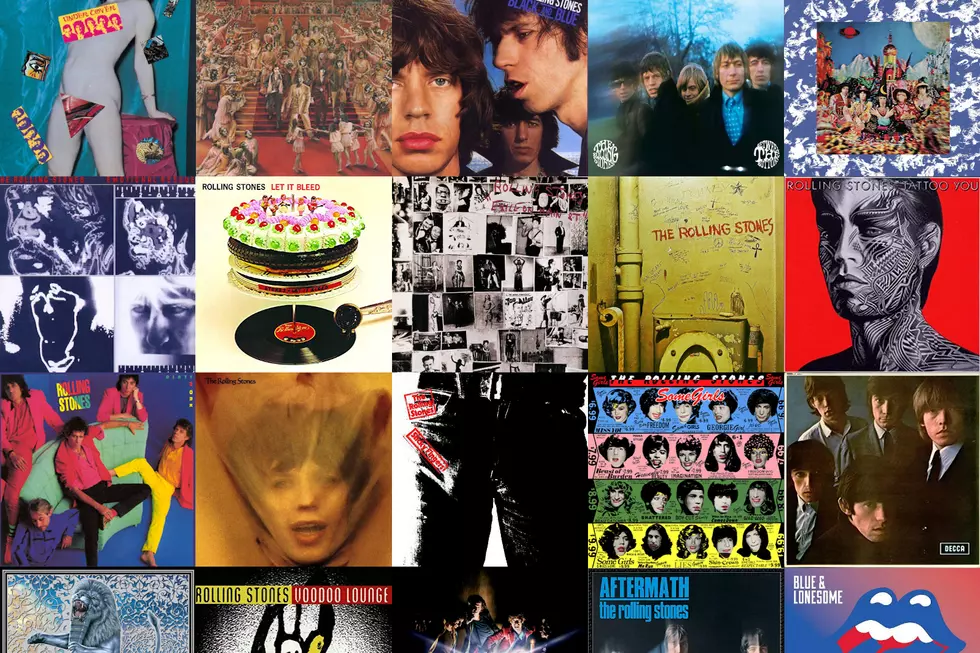
Underrated Rolling Stones: The Most Overlooked Song From Each Album
After nearly six decades of listening, criticism and analysis, it may be hard to call any Rolling Stones song underrated.
But in the below list of Underrated Rolling Stones: The Most Overlooked Song From Each Album, we’ve pulled out songs that may not have gotten all the attention they deserved. And on some of their second-tier records, we've uncovered gems that may have been overlooked altogether. None of these songs were singles but some have found a second life in concert and all of them deserve a listen.
Note that the list includes the original U.K. pressings of the records; the track listings on those albums and the U.S. versions were often quite different until they aligned on Their Satanic Majesties Request in 1967.
“Carol”
From: The Rolling Stones (1964)
The Stones covered six songs written by or popularized by Chuck Berry in the early part of their career. Their debut single was a Berry cover, “Come On,” but today it sounds tame and hesitant. They didn’t really capture the indefatigable rock energy of the master until “Carol” on their debut LP. Although their image as salacious bastards was in its infancy, you can hear it emerge in Mick Jagger’s vocal ... and so rock’s immortal bad boys were born. They returned to this cut without missing a step in 1969 for their infamous U.S. tour, immortalized on the 1970 live album Get Yer Ya-Ya’s Out!
“Down the Road Apiece”
From: The Rolling Stones No. 2 (1965)
A boogie-woogie tune written by Don Raye in 1940, “Down the Road Apiece” has made the rounds. The Stones likely learned it from Chuck Berry’s cover in 1960, as did Manfred Mann, who cut the track in 1964. This is an early showcase for “sixth Stone” Ian Stewart, who was a full-fledged member of the band on piano until Andrew Loog Oldham arrived as the group’s manager and suggested that the older Stewart was not a good fit for the rough young thug look the band was going for. Stewart remained with the Stones as roadie, tour manager and sometime piano player until his death in 1985.
“The Under Assistant West Coast Promotion Man”
From: Out of Our Heads (1965)
It’s hard to imagine just how busy the Rolling Stones were throughout most of the '60s. It was a constant onslaught of touring, recording, TV performances and, at first, every single promotion opportunity they could get. The band’s frequent encounters with record-company promotion execs inspired this sardonic takedown of the stereotypical toupee-sporting “promo man,” clad in polyester from head to toe and far less hip than the bands he worked with. The song was directly inspired by an actual west-coast promo man for Decca Records.
“Doncha Bother Me”
From: Aftermath (1966)
This 1966 album is when the Rolling Stones started looking like the band we know today. It’s the first album with only Jagger/Richards compositions and features some of Brian Jones’ most memorable instrumental contributions (from marimba to sitar). While Mick Jagger and Keith Richards widened their songwriting beyond three-chord blues for Aftermath, this song is a classic Chicago blues shuffle propelled by Jones’ exceptional slide guitar work.
“Miss Amanda Jones”
From: Between the Buttons (1967)
The Stones channel Chuck Berry for this sardonic kiss-off of a traditional British debutante. In previous bands, the Stones frequently took gigs to perform at debutante balls, where the food was excellent and the crowd was full of beautiful young women much like Amanda Jones. Jagger especially made many friends working the debutante circuit, including his first serious girlfriend as a Rolling Stone, Chrissie Shrimpton.
“2000 Man”
From: Their Satanic Majesties Request (1967)
Released as various Stones were bopping in and out of courtrooms and prison due to drug busts, Jagger has quipped that this album was “made under the influence of bail.” Critical reactions were mixed, and even today, many fans regard it as a half-baked attempt at Sgt. Pepper psychedelia. This is one of the standout tracks, an up-tempo folk ballad that follows the great psychedelic tradition of feeling like two or three separate songs glued together. In this case, the pieces fit just fine, with Charlie Watts as the unsung hero for keeping the whole thing connected through the tempo shifts.
“Parachute Woman”
From: Beggars Banquet (1968)
According to legend, the guitar and drum parts for “Parachute Woman” were recorded to a cassette player and then double-tracked for greater impact. The same trick was used to create “Street Fighting Man,” and you can hear that same jagged edge to Richards’ rhythm guitar and Watts’ drums. It’s an effect that creates tons of atmosphere at the heart of this track, which is surrounded by Jagger’s plaintive harmonica and vocal.
“Monkey Man”
From: Let It Bleed (1969)
In retrospect, 1969’s Let It Bleed album is full of songs that seem to predict the turbulent curdling of the '60s’ peace-and-love message as the decade drew to its close. Written as a tribute to an Italian pop artist, “Monkey Man” shares a prowling air of mystery with other Let It Bleed tracks, especially “Gimme Shelter” and “Midnight Rambler.” During the record’s production, founding member Jones was fired; a month later, he was dead. Weeks after release came Altamont, the notorious free concert where Hells Angels murdered a Stones fan. There’s no way the Stones could have known what was waiting in the wings as they finished “Monkey Man,” but whatever darkness was to come, they manifested it here, too.
“I Got the Blues”
From: Sticky Fingers (1971)
For this slow-burn soul ballad, Jagger and Richards take a page from Otis Redding’s playbook, building methodically to an emotional climax as the song’s horn riff, guitar lick and pulsing organ coax the track forward. Tackling a vocal that would be fitting for any one of Stax Records’ legendary soul men, Jagger doesn’t try to imitate; he finds his own groove by pulling back and letting restraint convey his broken heart until the final bars find him screaming and screeching out his love.
“Let It Loose”
From: Exile on Main St. (1972)
Can you really call any track from Exile on Main St. underrated? It’s widely recognized as one of the greatest rock albums of all time. Still, this cut that closes out Side Three of the original double album feels like a ray of holy sunshine somehow cutting through the grimy funky fog of the rest of the record. Jagger’s vocal is a stunner, but the real MVP may be Nicky Hopkins on rollicking piano and Bobby Keys and Jim Price on horns. There are other soaring moments on Exile, other moments that feel like some semblance of “redemption,” but when things kick in on “Let It Loose,” it almost seems like we’re going to make it.
“Coming Down Again”
From: Goats Head Soup (1973)
If Goats Head Soup feels generally deflated, maybe it’s because of the psychic and creative toll required to make Exile on Main St. just a year before. Goats Head Soup may feature more simple pleasures than the murky depths of Exile, but that’s part of its charm. “Coming Down Again” is a great example, an easy melancholy ballad with lead vocals by Richards that chronicles his infidelity to wife Anita Pallenberg, who was lost in the depths of heroin addiction. Once again, Hopkins’ piano sets the tone, while a rare appearance by Mick Taylor on bass features some surprisingly fluid playing from the lead guitarist.
“Time Waits for No One”
From: It’s Only Rock ’n Roll (1974)
This would be Taylor’s final album as a Stone. With this track, he exits on a high point. Taylor claimed to provide uncredited contributions to writing the song, and it’s his extended guitar solo in the song’s lengthy conclusion that ranks as perhaps one of the greatest solos in rock history. A sense of loss and fading beauty permeates the track, as though the singer recognizes his own decay even as the good times roll. Percussionist Ray Cooper also joins the Stones for the first time, contributing subtle instrumental touches that contribute to the melancholy mood.
“Crazy Mama”
From: Black and Blue (1976)
“Memory Motel” is unquestionably the best song on Black and Blue, an album used by the Stones to audition new guitarists to replace Taylor. Seeing as it’s been played on every Stones tour since 1994, it’s hard to call it “underrated.” “Crazy Mama” is one of those Stones rockers they seem to have recorded and then promptly forgot existed. Lyrically, Jagger is phoning it in, but the band absolutely cooks, maybe because it’s one of the only album cuts here that doesn’t feature a non-Stones guitarist trying to impress the Glimmer Twins. Instead, it’s Ronnie Wood pairing with Richards, who also provides uncharacteristic support on bass and piano.
“Lies”
From: Some Girls (1978)
This unhinged return to form for the Stones is packed with songs that were massive singles, AOR hits or quintessential live tunes. In fact, the only song that doesn’t fall into any of the above is the Side One closer “Lies,” which saw concert duty only in 1978. “Lies” has the feel of a barely contained animal rattling its way out of its cage; the whole thing just barely hangs together as a song, with the core Stones each playing wild. This cut captures the fierce interplay of the Richards and Wood dual guitar attack maybe better than any other Stones song since.
“All About You”
From: Emotional Rescue (1980)
“All About You” deserves a spot on this list if only for the exquisite opening horn riff played by sax man Bobby Keys. Aside from Keys, Wood contributes backing vocals and Watts plays drums; the rest is all Richards, including piano, bass and lead guitar. This is the first in a long-standing Stones tradition of closing albums with an aching solo ballad by Richards, with little to no involvement from Jagger. Lyrically, this song is often regarded as being about the disintegration of the Jagger/Richards relationship at the heart of the Stones. From this point forward, the Stones almost exist as two bands everywhere but on the concert stage.
“Black Limousine”
From: Tattoo You (1981)
This 1981 release is famously known as a leftovers record, compiled from outtakes that date back as far as 1972. It was assembled to provide a product behind which the Stones could tour, and yet it was both a critical and commercial smash, regarded by many as the Stones’ last great album. This loose up-tempo blues originated in the 1978 Some Girls sessions and earned Wood a cowriter credit.
“Wanna Hold You”
From: Undercover (1983)
There's not much to recommend about this '80s turd of a record; it’s the start of the clandestine warfare between the Jagger and Richards camps, and it sounds like it. If an Undercover cut has the dated bleeps and bloops of a synthesizer on it, it’s likely one of Jagger’s tunes. Richards wanted to take the band back to its blues-rock roots, and this track reflects that more traditional approach. That said, the original demo for the song allegedly features only Richards on guitar and vocals and ... Jagger on drums.
“Sleep Tonight”
From: Dirty Work (1986)
One of the best of Richards’ latter-era boozy Stones ballads, "Sleep Tonight" was written in the Paris recording studio where the band was working on Dirty Work. Inspired, Richards enlisted the only other Stone present, Wood, to jump in on drums; Watts later said, “He could not have done better.” Tom Waits also contributes piano to the track, which sounds like something you'd hear in a smoky bar 10 minutes past last call.
“Hold on to Your Hat”
From: Steel Wheels (1989)
This Stones comeback album ushered in the era of the band as megacorporation - new releases as cultural events and tours as massive nomad villages carting band, family and crew around the world to play for gigantic audiences. Still, stories suggest the music emerged from a genuine reunion of the Jagger/Richards partnership, with the pair meeting and writing 50 songs in a matter of weeks. This vintage up-tempo Stones song spotlights the endless gifts of Richards inside a tight rhythm section and some choice licks by Wood.
“Moon Is Up”
From: Voodoo Lounge (1994)
Voodoo Lounge didn’t spawn any hit singles, although it did reach gold or platinum in many countries. Contemporary reviewers dismissed it as “more of the same” from the Stones, but it's surprising how much variety appears across the album; there are songs that evoke blues, country, folk, pop and even a hint of psychedelia. “Moon Is Up” is hard to characterize but instantly memorable - upbeat, sparsely instrumented and full of hooks. Perhaps its standout feature is the percussion, which Watts played on a garbage can lid with brushes.
“You Don’t Have to Mean It”
From: Bridges to Babylon (1997)
By 1997, relations between Jagger and Richards had once again soured, resulting in another album with divided ambitions. While Jagger chased relevance by working with a range of “hot” producers (the sample-lovin' Dust Brothers are the highest-profile example), Richards continued his own exploration of blues, rock and, in this case, reggae. It feels completely different from anything else on the record or even anything the Stones had attempted for a decade or more. That’s perhaps what’s most engaging about it: It’s pop reggae that feels tossed off but lingers in the brain.
“Look What the Cat Dragged In”
From: A Bigger Bang (2005)
With nothing left to prove, the Stones machine chugged on into the mid-'00s with A Bigger Bang, widely regarded as a back-to-basics record centered on the core Stones trio of Jagger, Richards and Watts, with Wood playing a supportive and additive role. This song sums up everything the Stones bring to the table, even when it’s just a deep album cut on their 22nd LP: a killer riff, funny and smarmy lyrics from Jagger and propulsive rhythm.
“I Gotta Go”
From: Blue and Lonesome (2016)
Recorded in three days, 2016’s Blue and Lonesome was an unexpected blast of pure Chicago blues from the Stones. There’s not a bad cut in the bunch, but this jump blues never made it out as a single and captures the sheer enthusiasm behind the project. The band is at the height of its late-career powers, with Jagger’s harmonica work and vocals top-notch. This song, and the album itself, takes the band back to the raw blues music that brought everyone together in the first place.
Rolling Stones Live Albums Ranked
More From KLTD-FM










